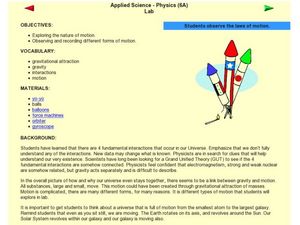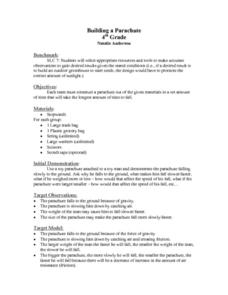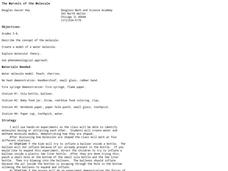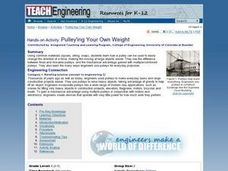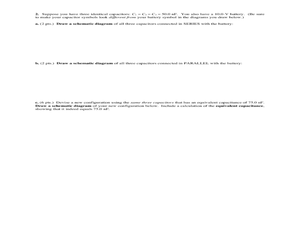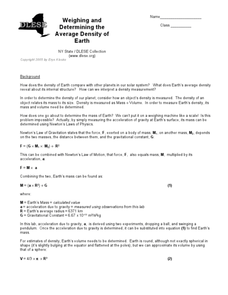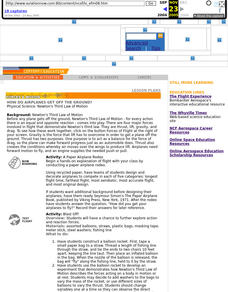Curated OER
Motion Experiment
Students experiment with the laws of motion. In this motion instructional activity, students explore Newton's Laws of Motion. Students work in groups experimenting with different objects and observing different types of motion.
Curated OER
Building a Parachute
Fourth graders construct a parachute using specified materials in a set amount of time. They observe a toy parachute attached to a toy man and discuss what makes him move slower or faster. Then in small groups they design, construct,...
Curated OER
The Marvels of the Molecule
Students experiment with common substances to observe molecular behavior. In this molecular properties lesson, students move through four stations as they try to inflate a balloon inside a bottle, pour water from a jar, and observe how...
Curated OER
TE Activity: Pulley'ing Your Own Weight
Students experiment with common objects such as spools, string and soap to determine how pulleys make it easier to move large objects. They look at the difference between fixed and movable pulleys. They examine the many uses engineers...
Curated OER
Newton's Laws
Beginning with definitions of mass and foce, this excellent set of slides summarizes Newton's Laws of motion and universal bravitaions. Components of each law are explained along with examples and questions to inspire discussion. This is...
Curated OER
Magnetic Field and Electromagnetism
Here you will find a simple presentation on magnetic, gravitational, and electric fields. One of the two links to outside animations no longer is valid, and oneof the slides lists extension activities that are specific to a physics...
Curated OER
Pop Rocket - Trash to Treasure
First off, Newton's laws of motion aren't often taught at 2nd grade, so this lesson may be more appropriate for upper elementary learners. It begins with a discussion and demonstration of the laws of motion, and then has individuals...
Curated OER
Gravity Study Guide
In this gravity worksheet, students define terms such as free fall, terminal velocity, and inertia. Then students compare the different types of forces that act upon objects. This worksheet has 9 short answer and 4 fill in the blank...
Curated OER
What Makes a Kite Fly?
Ninth graders compare the nature of forces of gravity, lift, thrust, and drag. They select proper materials for making a kite and attach a proper tail. Students interpret and summarize the observations made during the flight of the kites.
Curated OER
Fall 2003 Midterm Exam #1
Electricity is the focus of this college-level midterm exam. It requres physics learners to answer multiple choice and short answer questions in addition to evaluating several diagrams and graphs. This is appropriate for most high school...
Curated OER
Midterm Exam #1, Electricity Concepts
The physics department at The University of Hawaii has designed midterm exams for their college physics courses. This version deals with electricity concepts. It requires learners to calculate conversions, capacitance, and potential...
Curated OER
Simple Machines III - Pulleys
The principles behind pulleys, levers, and simple machines are the focus of a science instructional activity. In it, learners take part in a whole-class activity. There are two groups of pupils who each must lift objects with fixed...
Curated OER
Weighing and Determining the Average Density of the Earth
Some background information about density and Newton's Laws of gravitation and motion assist pupils in the following experiment. The procedure will help them further their understanding of gravity, pendulums, and a drop-ball experiment....
Curated OER
Exploring the Water Cycle
The water cycle is one of earth's most easily observable processes, but demonstrating each step within classroom walls can be a challenge. Through a series of videos and quick demonstrations, cover each aspect of the hydrologic cycle in...
Curated OER
Action-Reaction! Rocket
Students construct a rocket from a balloon propelled along a guide string. They use this model to learn about Newton's three laws of motion, examining the effect of different forces on the motion of the rocket. They measure the distance...
Curated OER
Lesson-Mass and Weight
Student identify the three stationary positions, on the Earth, on the Moon, and in a house floating atop the cloud layers of Jupiter. They also identify the three orbiting positions, orbiting the Earth, orbiting the Moon, and orbiting...
Curated OER
Falling
Students should describe the path that the motion would take as well as what might begin or stop the motion. The common characteristic of all the motions that students have experienced directly is that one or more forces are acting on...
Curated OER
Perching Parrot
Students explore the concepts of center of mass and static equilibrium by seeing how non-symmetrical objects balance. They also analyze why all forces on an object must cancel out exactly for an object to be stationary.
Curated OER
How Do Airplanes Get Off the Ground
Students construct various types of paper airplanes, exploring action and reaction forces by conducting a paper airplane rodeo. Students then discuss how Newton's Third Law of Motion affected their planes.
Curated OER
Physics Unit 8: 1
For this physics unit 8 worksheet, students construct a qualitative motion map as it relates to centripetal force of a described scenario. Students respond to questions as it relates to acceleration and the magnitude of the centripetal...
Curated OER
Toys in Space
Pupilsexplore how gravity affects the operation of toys and simple machines. They watch a video and experiment with simple machines.
Curated OER
Pumps
Students examine the basic types of pumps. They build a gravity-driven water pump and solve a mystery using their knowledge of pressures and pumps.
Curated OER
That Mu You Do
Students discussion frictional force, kinetic friction, and static friction and the role each plays in acceleration and velocity in relationship to a car and the road on which it is traveling. Students complete instructional activity...
Curated OER
In What Direction Do Seeds Grow?
Students predict and examine the direction seeds grow and thereby explore the effects gravity has on seeds and plants. They perform this inquiry in-class by keeping track of how beans grow.
